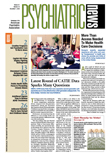One of the many facets of the National Institute of Mental Health (NIMH) is its Career Opportunities in Research (COR) program, which helps minority college students pursue a career in mental health research.
Applicants are evaluated by the host institution, mostly colleges or universities that serve primarily blacks and Hispanics. COR trainees work in the research lab of their mentor, assist with experiments, and submit scientific papers for publication.
November was an important month for the COR program. First, it celebrated 25 years of progress in achieving its goal—creating diversity in America's mental health research workforce. For example, 95 percent of the 1,078 COR graduates have gone on to earn a baccalaureate degree within one year of completing the COR program, and 86 percent have advanced to graduate school. In addition, the COR program held its annual colloquium for COR participants in Washington, D.C.
At the colloquium, some 160 minority students who were currently participating in the COR program at their respective colleges delivered talks or presented poster sessions about their research.
One presentation was given by April Davis of the State University of New York College in Old Westbury. Davis surveyed 84 Hispanic or African-American children living in the same working-class neighborhoods to see whether they differed in the amount of fear they displayed to various stimuli. The tool she used was the Fear Survey Schedule for Children-Revised. She then compared these data with data from middle-class white children. Compared with the middle-class white youth, the Hispanic youth reported more fear, and the African-American youth less.
Another thought-provoking presentation was given by Lyndsey Collins of Spelman College in Atlanta and by Robin Ramey, Shellye Jones, and Kiyoko Clemons of California State University at Northridge. They assessed the views of 67 HIV-positive black men and women toward participating in a HIV-vaccine clinical trial.
A recurring theme among study participants was their lack of being informed about such trials by health care personnel, making them feel as though researchers were not interested in seeking them out.
Also of note, Wilmarie Diaz-Casillas and Ina Teron-Molina of the University of Puerto Rico, along with Yaihara Fortis-Santiago of Brandeis University, exposed rat fetuses to an SSRI antidepressant, then followed them after they were born to see whether the antidepressant had any influence on their behavior. The students found that the rat pups that had been exposed to the antidepressant took longer to detect and interact with their mothers than did pups not so exposed. Also, during adolescence and adulthood, the female pups that had been exposed to the antidepressant before birth showed a significant reduction in social interactions compared with nonexposed females. However, the male pups that had been exposed to the antidepressant before birth did not differ on social-interaction tests from males that had not been exposed.
Some COR alumni also gave talks at the colloquium, either about their graduate training or their lives as independent investigators. For example, Robert Sellers, Ph.D., of the University of Michigan's Institute for Social Research talked on “Souls of Black Folk: Findings From a Research Program on African-American Racial Identity.” Tassy Parker, Ph.D., of the University of New Mexico discussed “Health Research: Promoting Cultural, Social, and Mental Health Justice for Incarcerated American Indian Youth in New Mexico.” Jacqueline Nassy Brown, Ph.D., of Hunter College gave the keynote address: “Why I Love My Job in Research.”
COR research mentors, recruiters from graduate schools, and Nimh program staff also attended the colloquium.
Sarah Lisanby, M.D., an associate professor of clinical psychiatry at columbia University, has been a COR research mentor for a year. She supervised Kirwan Walsh of Mercy College in Dobbs Ferry, N.Y., while he explored the impact of transcranial magnetic stimulation on working memory in sleep-deprived individuals. As Lisanby told Psychiatric News,“ I think the program provides a wonderful opportunity for young scientists. It helps them gain exposure and helps them pursue their research interests at a critical phase in their careers.”
The COR program is one of two National Institutes of Health programs that support undergraduate education for minority college students.
Information about the COR program is posted at<www.nimh.nih.gov/scientificmeetings/cor/index.cfm>.▪
